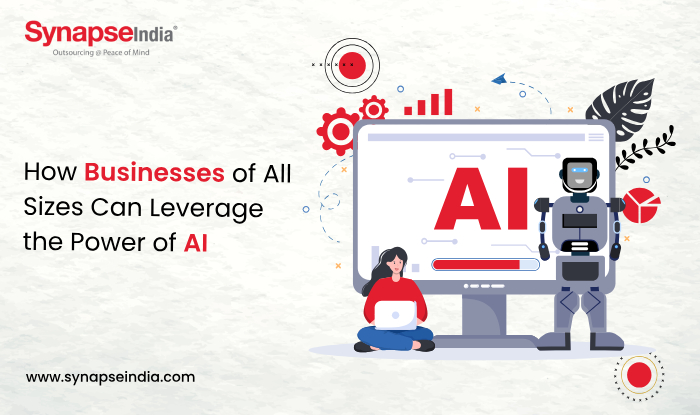 28 Jun 2024
28 Jun 2024
Artificial intelligence (AI) has become a revolutionary force in the current digital era, changing the way businesses function and opening up new avenues for expansion and creativity. Advancements in AI algorithms, cloud computing, and automation tools have made artificial intelligence (AI) available to organizations of all sizes. Previously, AI was thought to be a technology exclusive to large enterprises with ample resources. Organizations in various sectors of the economy are using artificial intelligence (AI) to improve decision-making, increase productivity, and provide outstanding customer experiences. These range from startups and small businesses to major multinationals. We'll look at how companies of all sizes may use AI to their advantage in this blog post to prosper in the digital era and maintain their competitive edge.

The term "artificial intelligence" (AI) refers to a broad category of devices and software that can mimic human intelligence and carry out operations that normally call for human thought. Recent years have seen a rapid evolution of these technologies, resulting in ground-breaking developments in a wide range of sectors and businesses. An outline of some important AI technologies and their uses is provided below:
The goal of the artificial intelligence (AI) field of natural language processing (NLP) is to empower machines to comprehend, translate, and produce human language. NLP is used in content creation tools, virtual assistants, language translation services, and customer care automation systems.
A branch of artificial intelligence known as "machine learning" focuses on teaching algorithms to learn from data and make judgments or predictions without explicit programming. Applications for machine learning (ML) can be found in many different sectors, including healthcare, finance, marketing, and manufacturing. ML approaches include supervised learning, unsupervised learning, and reinforcement learning.
AI's discipline of computer vision makes it possible for machines to analyze and comprehend visual data from pictures or movies. Computer vision is used in surveillance systems, augmented reality (AR), medical imaging diagnostics, self-driving automobiles, and industrial quality control, among other applications.
AI, mechanical engineering, and electronics are all combined in robotics to create autonomous machines, or robots, that are capable of carrying out tasks in the real world. Robotics finds applications in everything from space exploration, agriculture, and healthcare support to industrial automation and warehousing logistics.
AI applications and technology are constantly developing and growing, spurring innovation and industry revolution. We may anticipate ever more advanced and significant AI-driven solutions that tackle difficult problems and open up new avenues for enterprises and society at large as AI research and development continue.

Automation is one of the main ways that organizations may use AI. Businesses may increase operational efficiency, decrease manual labor, and streamline repetitive tasks with the use of AI-powered automation technology. AI-driven automation may help companies of all sizes run more effectively and efficiently, whether it's by managing back-office duties, streamlining supply chain logistics, or automating customer care procedures.
Making well-informed judgments is essential for company success in today's data-driven environment. Artificial intelligence (AI) tools like machine learning and predictive analytics enable companies to quickly and efficiently make data-driven choices by mining massive amounts of data for insightful information. Businesses of all sizes may make better decisions and achieve better results by utilizing AI to analyze data and find useful insights.
Providing individualized experiences is crucial for encouraging repeat business and fostering client loyalty. Businesses can customize their goods, services, and marketing messaging to each customer's specific requirements and preferences by using AI-powered customization solutions. AI helps companies build stronger relationships with their customers by facilitating more meaningful interactions, such as personalized website content, email marketing campaigns, and product recommendations based on past purchase history.
Artificial intelligence (AI) technology can be extremely useful in promoting teamwork and productivity. Artificial intelligence (AI)-driven collaboration solutions, such as chatbots and virtual assistants, improve employee communication, expedite processes, and increase information availability. Businesses may spur innovation, expedite decision-making, and achieve better business outcomes by utilizing AI to increase productivity and cooperation.
Business thrives on creativity, and AI is spawning a fresh wave of innovation in a variety of sectors. AI is helping companies to innovate more quickly and remain ahead of the competition by helping them to create innovative goods and services as well as whole new business models. In the digital age, companies of all sizes may set themselves up for long-term success and promote sustainable growth.
AI has the power to completely change companies of all sizes by improving their operational efficiency and decision-making ability to provide great customer service, and ability to spur innovation. The time has come for all businesses, big or small, to embrace artificial intelligence (AI) and realize its full potential to succeed and prosper in the digital era.

